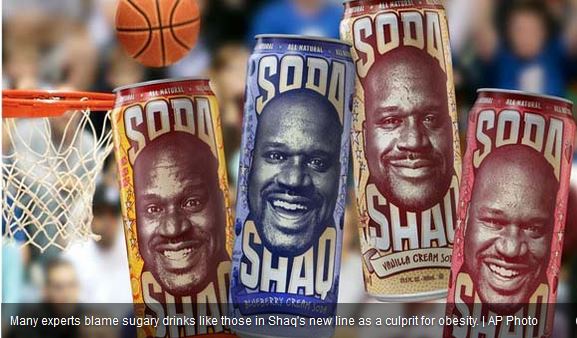When Michele Obama had signed on Beyoncé and Shaquille O’Neal for Let’s Move! campaign, it managed to raise few eyebrows in the world of nutritional research and pediatrics, as they both endorse sodas, which are a major contributor to the obesity epidemic. Now there’s more evidence of how powerful a celebrity — especially a professional athlete — can be in influencing children’s behavior.
In a report published by the Rudd Center for Food Policy and Obesity at Yale University in the journal Pediatrics, researchers studied 100 professional athletes and their endorsement contracts, using BusinessWeek’s 2010 Power 100 report, which ranks athletes based on their endorsement value and prominence in their given sport. The team focused on athletes since they are theoretically the best role models for active, healthy lifestyles for children. After sorting the deals by category, they determined that among the 512 brands associated with the athletes, most involved sporting goods, followed closely by food and beverage brands.
Best endorsers for worst foods
Of the 512 brand endorsements, 122 were for food and beverage, and these made up about 24 percent of all the deals. LeBron James (Sprite, Vitaminwater, McDonald’s, Powerade), Peyton Manning (Gatorade, Wheaties, Pepsi), Eli Manning (Papa Jones, Dunkin Doughts) and Serena Williams (Oreo, Gatorade, Nabisco) had more food and beverage endorsements than any other athlete.

Sports drinks topped the list of food and drink deals, followed by soft drinks and by fast food. And here’s the nutritional profile of athlete endorsed food: About 80 percent of the foods were energy-dense and nutrient-poor, and 93 percent of the beverages were sugar water, receiving 100 percent of their calories from added sugar.
Football star Manning reportedly earns $10 million a year from contracts with Papa John’s Pizza, Gatorade, Wheaties and other companies that do not sell food, the researchers said based on the report published. Lakers basketball star Kobe Bryant earned an estimated $12 million a year from his endorsement contract with McDonald’s, they said. James, also a basketball star, was reported to receive $5 million to endorse Bubblicious Gum; one flavor was called LeBron’s Lightning Lemonade.
Such money suggests “how much food and beverage companies value associations with celebrity athletes,” the researchers wrote.
Why is there a striking irony of having someone so physically fit as these athletes promoting such unhealthy foods?
Why is it when it comes to their personal health, they eat and live healthy lifestyle but for the right price these role models of health and fitness will recommend and influence our kids to eat junk nutrient poor foods?
Marketing junk leads to eating lots of junk. Junk endorsed by sport idols — the very picture of health and fitness — removes barriers of judgment, and leads to eating even more junk. And the most talented star athletes are promoting the worst foods.
Our kids don’t realize that in real world, eating fast food and drinking sugary drinks leads to obesity and disease, not to winning Super Bowls and Grand Slams. An athlete’s endorsements associated with foods and drink’s is supposed to be healthy and is supported with fitness and vigor.

We urge athletes to become aware of the nutritional worth of these products before endorsing them and to stop promoting nutrient poor foods that create confusing mixed message especially for kids.
Although junk food and cigarettes are not the same, the Pediatrics article reminds us that Babe Ruth, Joe DiMaggio and Lou Gehrig appeared in tobacco ads, and it was only public pressure that did away such practices. Until such pressure is applied to junk food, we’ll continue to see the world’s premiere sports competitions like the Olympics brought to us by McDonald’s and Coca-Cola, and the athletes our kids admire suggesting to them that junk food makes you strong.
